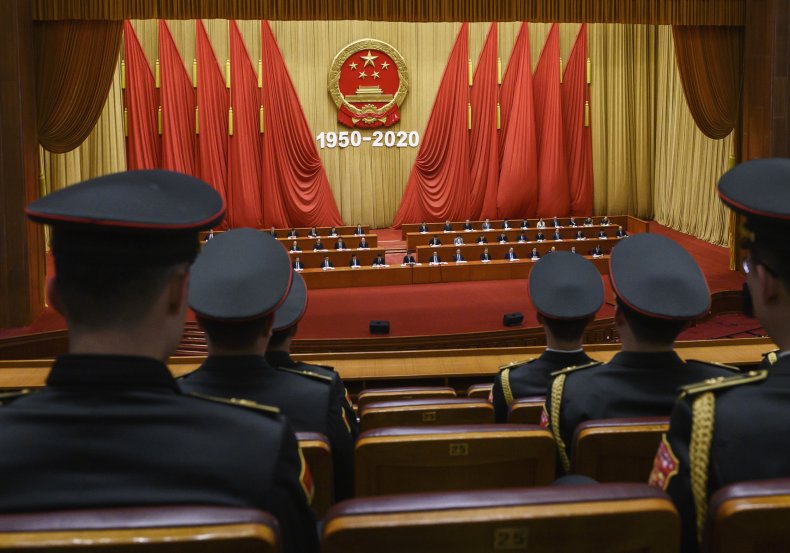China Tells U.S. to Scale Back Asia Forces Amid Rising Tensions
A Chinese official advised the United States to show more sincerity and scale back its forces in Asia in order to defuse tensions between the nation's militaries.
This comes amid recent chatter about the need for more confidence-building measures to avoid accidental clashes in regional hotspots.
At a monthly Chinese defense ministry press briefing on Thursday, spokesperson Tan Kefei said the Biden administration's Indo-Pacific strategy "intentionally hypes up conflict and confrontation" by encouraging military alliances and "cliques."
Clique is often used by Beijing to identify the Quadrilateral Security Dialogue, a coalition between the U.S., Japan, India and Australia—four influential powers spanning the Indian and Pacific oceans.
The Quad is seen as a central element in the Indo-Pacific strategy to balance China's growing military and its ambitious economic initiatives, which span every continent bar North America.
The phrasing of "Indo-Pacific," otherwise called the "Asia-Pacific," was borrowed from former Japanese Prime Minister Shinzo Abe's "Free and Open Indo-Pacific" vision. It was first adapted during the Trump administration.
Tan told reporters the strategy was "instigating a new Cold War featuring bloc confrontation." The Chinese official also responded to recent discussions about how best to manage the tense relationship between China and the U.S.
This month, a U.S. defense official told Foreign Policy that the Pentagon was looking to establish more defense hotlines with China in order to decrease risk between the two militaries—which are frequently meeting in the South China Sea, Taiwan Strait and Western Pacific.
The Biden administration wants to "create multiple avenues to communicate with Beijing to manage the growing strategic competition between the two powers and prevent the onset of a potential conflict," the magazine reported.
A few days earlier, Kurt Campbell, the top White House adviser for Asia, had told the Financial Times that Washington's attempts to contact officials in Beijing via the hotline have resulted in it "just [ringing] in an empty room for hours upon hours."
"The Chinese and American militaries have always maintained communication through multiple channels, including a direct line between the defense ministries," China's Tan confirmed Thursday. "Our belief is that hotlines are for the purposes of building trust, dispelling doubts, managing crises and preventing conflicts. "
He added: "The U.S. cannot claim to want more defense hotlines on the one hand, while on the other hand continuing to increase military deployments in the Asia-Pacific and frequently conducting close-in reconnaissance of China—even deliberately initiating dangerous circumstances where vessels and aircraft nearly collide.
"We call on the U.S. to be consistent with its words and actions, show sincerity, increase communication and meet China halfway in order to manage differences and promote healthy and stable relations between our two militaries."
Last week, a Reuters reported revealed that Defense Secretary Lloyd Austin had been unable to speak with China's top general Xu Qiliang, despite repeated attempts.
Defense Minister Wei Fenghe is Austin's opposite number in Beijing, but Xu—vice chair of the Central Military Commission headed by Xi Jinping—is seen as being more senior and having more influence with the Chinese president.
A Biden official told Reuters that the U.S. wanted "dialogue at the proper level."
The comments were echoed at a Stanford University event on Wednesday, when Campbell said Xi had "almost completely disassembled nearly 40 years of mechanisms designed for collective leadership" since becoming party leader in 2012.
As a result, Politburo member Yang Jiechi and Chinese Foreign Minister Wang Yi—the pair who clashed with U.S. officials in Alaska in March—were "nowhere near, within a hundred miles" Xi's inner circle, he added.
Campbell, who is President Joe Biden's Indo-Pacific coordinator, said the former U.S. policy to engage with China had ended. "The dominant paradigm is going to be competition," he said.
Newsweek has contacted the Pentagon and the Chinese Embassy in Washington, D.C. for comment.


